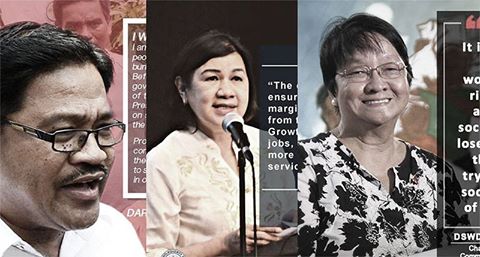Kilab Multimedia
February 7, 2017
As heads of national government agencies tasked to address poverty and improve the quality of life of the Filipino, we believe that the GRP should move the peace negotiations with the NDFP forward. The current agenda on the table, the Comprehensive Agreement on Social and Economic Reforms (CASER), is the most substantive agenda in the negotiations and is key to lasting peace and long-term poverty eradication. We are one with the peace advocates, legislators, and individuals who urge both parties to resume the talks. We will continue to engage within the Cabinet and the rest of the administration towards the resumption of the talks and to strengthen the civilian voice in the peace process.
After 15 years of impasse, the peace negotiations have made historic strides on many fronts. This time, by pursuing peace, and through the political will of President Duterte, the talks have been productive. The Government and the National Democratic Front of the Philippines have never been closer in their articulation of a shared vision of a society that addresses the root causes of war – poverty and inequality.
In the 3rd round of talks in Rome, both parties surpassed earlier expectations and were able to exchange initial views on their respective drafts of the CASER. They have reached a common understanding of the problems the agrarian unrest in the country and have agreed in principle to the free distribution of land to farmers and farm workers. Both parties also reached a decision to accelerate the negotiation process through simultaneous discussions of technical working committees of the remaining substantive agenda, as the discussion on the CASER commences.
The Reciprocal Working Groups on Political and Constitutional Reforms (RWGs-PCR) were able to exchange views on the proposal to form a federal form of government and the need for safeguards and constitutional guarantees as demanded by the people.
Both parties were looking forward to meeting again in the fourth round of talks to flesh out these agreements and move to address the issues of land reform and rural development, national industrialization and economic growth, access to social services, patrimony and sovereignty.
While the government carries on with negotiating the agreements, the agencies under the Human Development and Poverty Reduction Cluster are working on the direct, immediate and substantial benefits that are advantageous to the poor and the marginalized sectors of the society.
Recognizing the urgent need for genuine change, the President has made a commitment to lift nine million Filipinos out of poverty by the end of his term. The statement adds weight to the Government’s work in implementing a genuine agrarian reform, building its industries, and promoting social welfare and development as an integral part of poverty alleviation.
The foremost concern of both parties in the peace negotiations is the interest of the Filipino people to address the roots of poverty and achieve a just and lasting peace. It is unfortunate that the talks have now come to a standstill. Let each side come to terms with the compelling reasons why we have come to the negotiating table in the first place. For it is the welfare of the poor Filipinos, in their millions, that is at the core of the peace negotiations. Let us give just and lasting peace a chance. Continue the GRP-NDF peace talks and pursue socio-economic and political reforms for the people.
###

